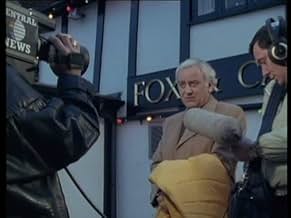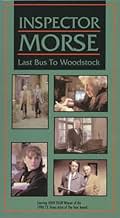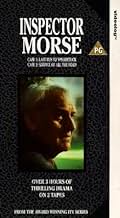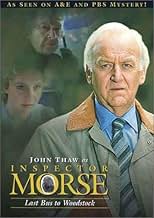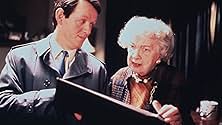A young blonde hitches a late lift from a bus stop and ends up dead in a pub car park.A young blonde hitches a late lift from a bus stop and ends up dead in a pub car park.A young blonde hitches a late lift from a bus stop and ends up dead in a pub car park.
- Director
- Writers
- All cast & crew
- Production, box office & more at IMDbPro
Featured reviews
"Last Bus to Woodstock" is one of those typical Morse episodes that brings in several plots and makes you concentrate, which is a good thing.
A young woman, Sylvia Kane, is found dead in the car park of a pub. On her is an empty envelope addressed to someone else, Jennifer Coleby, and a letter, written in code. Morse guesses the envelope was full of money. She was intending to meet a young man at the pub.
Sylvia was hitching a ride to Woodstock when last seen. A visit to where she worked doesn't yield much, except Jennifer Coleby (Jill Baker) works there, and she's having an affair with the boss.
Coleby lives in a house and takes in roommates. One is a nurse, Mary, and another a student, Angie. Jennifer claims to know nothing about the letter and says that, while it was addressed to her, she was to pass it to someone else.
To whom was she to pass the letter? What was really in it? If it was money, who has it? Where is the person who picked Sylvia up? Is that the killer? Morse and Lewis have a lot to work out.
Excellent episode with marvelous acting by Morse, Kevin Whately, Anthony Bate, Jill Baker, and Fabia Drake, who plays an elderly witness to the hitchhiking. The denouement is not what you'd expect.
This is one series I really miss, particularly the character of Morse. I guess I'm not alone, or we would have had the "Inspector Lewis" series and "Endeavor."
A young woman, Sylvia Kane, is found dead in the car park of a pub. On her is an empty envelope addressed to someone else, Jennifer Coleby, and a letter, written in code. Morse guesses the envelope was full of money. She was intending to meet a young man at the pub.
Sylvia was hitching a ride to Woodstock when last seen. A visit to where she worked doesn't yield much, except Jennifer Coleby (Jill Baker) works there, and she's having an affair with the boss.
Coleby lives in a house and takes in roommates. One is a nurse, Mary, and another a student, Angie. Jennifer claims to know nothing about the letter and says that, while it was addressed to her, she was to pass it to someone else.
To whom was she to pass the letter? What was really in it? If it was money, who has it? Where is the person who picked Sylvia up? Is that the killer? Morse and Lewis have a lot to work out.
Excellent episode with marvelous acting by Morse, Kevin Whately, Anthony Bate, Jill Baker, and Fabia Drake, who plays an elderly witness to the hitchhiking. The denouement is not what you'd expect.
This is one series I really miss, particularly the character of Morse. I guess I'm not alone, or we would have had the "Inspector Lewis" series and "Endeavor."
Definitely one of the best early episodes of Morse. I find pacing can be a slight issue with the earliest episodes, but that remark is not applicable here, this moves along very nicely, it asks the viewer a load of questions, and definitely tests your powers of observation. Complex relationships and a string sub plots that are all resolved in a very satisfying conclusion.
The scene where the girl is witnessed getting into an unknown car by Mrs Jarman is so strong, it's very clever, as a viewer you know something bad is going to happen, and an observer Mrs Jarman catches a glimpse, but it's staged in such a way that she only gets a glimpse. It's very very clever.
Beautifully acted, Morse and Lewis are up to the usual standard, but Anthony Bate and Fabia Drake are both excellent, two mature actors with lots of presence.
Very satisfying 9/10
The scene where the girl is witnessed getting into an unknown car by Mrs Jarman is so strong, it's very clever, as a viewer you know something bad is going to happen, and an observer Mrs Jarman catches a glimpse, but it's staged in such a way that she only gets a glimpse. It's very very clever.
Beautifully acted, Morse and Lewis are up to the usual standard, but Anthony Bate and Fabia Drake are both excellent, two mature actors with lots of presence.
Very satisfying 9/10
Loved this one. Apart from a very silly plot point involving a coded letter found on the victim Last Bus To Woodstock is classic Morse. At this point it felt like the muder rate in Oxford was topping Los Angeles, but the scene where Morse visits the three female housemates is wonderful. He really should stop trying to get off with murder suspects, though!
Shame this was Peter Woodthorpe's last episode. As the gravelly but darkly humorous Max he was always a delight, Almost as fruity as he was in Evil of Frankenstein!
Shame this was Peter Woodthorpe's last episode. As the gravelly but darkly humorous Max he was always a delight, Almost as fruity as he was in Evil of Frankenstein!
"You're going to like this one. Quite a puzzle", says Max in this adaptation of Colin Dexter's first novel. Quite right: A girl is dead, and in her purse is a mysterious envelope, empty but for a coded letter, reading "Take this, please."
One of the best Morse episodes, Last Bus to Woodstock has a plot that twists and turns, keeping both Morse and the viewer stumped until the last moment, when the dreadful truth sinks in.
Gender roles and loneliness are the recurring themes that serve as the foundation for this visit to Oxford: Among the dozens of characters introduced, all but two live hauntingly lonely lives, coping as they may -- through drinking, gambling, sex and adultery.
The first exception is an old miss Marple type. She has learned to deal with the loneliness, or even appreciate it. The second exception is Angie, a young and amiable English literature student, who has yet to face the harsh facts of life. Of course, her innocence can't last, and eventually she gets her unpleasant rite of passage into adulthood.
As often with Morse, the conclusion is only half satisfying: Although the case is closed, there's no sense of justice being fulfilled, only lives ruined, a little more misery in an already miserable world. The Inspector Morse series never drew the nicest picture of society, but in this episode, it seems particularly grim.
One of the best Morse episodes, Last Bus to Woodstock has a plot that twists and turns, keeping both Morse and the viewer stumped until the last moment, when the dreadful truth sinks in.
Gender roles and loneliness are the recurring themes that serve as the foundation for this visit to Oxford: Among the dozens of characters introduced, all but two live hauntingly lonely lives, coping as they may -- through drinking, gambling, sex and adultery.
The first exception is an old miss Marple type. She has learned to deal with the loneliness, or even appreciate it. The second exception is Angie, a young and amiable English literature student, who has yet to face the harsh facts of life. Of course, her innocence can't last, and eventually she gets her unpleasant rite of passage into adulthood.
As often with Morse, the conclusion is only half satisfying: Although the case is closed, there's no sense of justice being fulfilled, only lives ruined, a little more misery in an already miserable world. The Inspector Morse series never drew the nicest picture of society, but in this episode, it seems particularly grim.
10grantss
The best Morse episode to that point. Everything just gels so well here. There's none of the clumsiness of the first season, the pointless sub-plots that were also a feature of the early stuff or the ridiculously complex plot of the previous episode. It's as if the writers tinkered with the formula until they got it right and this is the one whre it happened.
There's a fair amount of intrigue: a young woman murdered in a parking lot, a cryptic note in her posession, a host of seemingly unconnected individuals living their lives. The seemingly unconnected individuals add another layer in that their mini-stories are quite interesting. The young English student was wonderfully enchanting with her intelligence and boundless energy.
Another great character was the old lady who witnessed the red car. Great value as she showed Morse and Lewis how to do policework.
All these interesting little sub-plots and colourful characters make for a very engaging episode.
There's a fair amount of intrigue: a young woman murdered in a parking lot, a cryptic note in her posession, a host of seemingly unconnected individuals living their lives. The seemingly unconnected individuals add another layer in that their mini-stories are quite interesting. The young English student was wonderfully enchanting with her intelligence and boundless energy.
Another great character was the old lady who witnessed the red car. Great value as she showed Morse and Lewis how to do policework.
All these interesting little sub-plots and colourful characters make for a very engaging episode.
Did you know
- TriviaThis is the last episode featuring Peter Woodthorpe as pathologist Max.
- GoofsAt the beginning after examining the body Dr. DeBryn removes his gloves from the outside instead of the usual inside-out manner used by medical professionals. He would have contaminated his hands by removing his gloves in this fashion.
- Quotes
[talking about deathbed confessions]
Chief Inspector Morse: The church loves a repentant sinner. Good for business.
- Crazy creditsVass Anderson is credited as Mr Bently but addressed as Mr Gill (Hardware shop owner).
- SoundtracksCosì fan tutte
Composed by Wolfgang Amadeus Mozart
Details
- Release date
- Country of origin
- Official site
- Language
- Filming locations
- Production companies
- See more company credits at IMDbPro
Contribute to this page
Suggest an edit or add missing content

